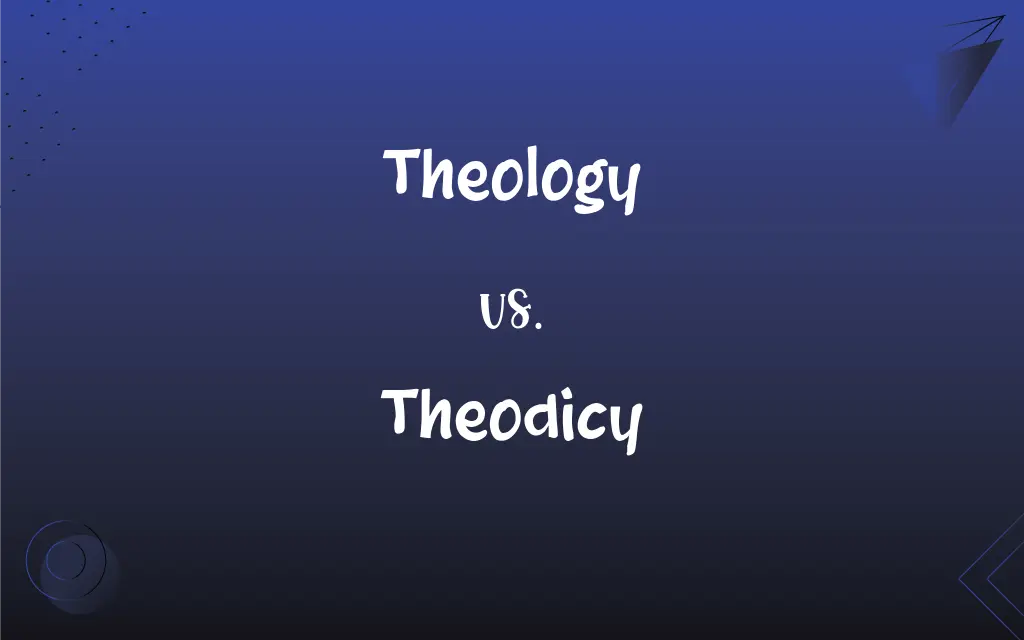Theology vs. Theodicy: What's the Difference?
Edited by Aimie Carlson || By Harlon Moss || Updated on November 6, 2023
Theology is the study of the nature of the divine, while theodicy deals with the problem of evil in light of a deity's goodness.

Key Differences
Theology and theodicy, although both involve the study of the divine, serve distinct purposes within religious discourse. Theology encompasses the broad and systematic study of concepts related to God, divinity, and religious belief. It is the foundation upon which religious understanding and practice are built, analyzing aspects like the nature of the divine, religious experiences, and the practice of faith. Theodicy, on the other hand, is a more focused theological endeavor that seeks to reconcile the existence of evil and suffering in the world with the notion of a good and omnipotent deity.
Theology, from its Greek roots, translates to the "study of God," and it has historically been a central discipline in religious studies, with scholars examining scriptures, traditions, and the nature of religious experiences. Theodicy, derived also from Greek, meaning "justifying God," tackles the philosophical and theological problem of how to understand the existence of evil if one believes in a benevolent and all-powerful God. Theologians may consider theodicy as part of their broader inquiries, while those focusing on theodicy delve into specific questions of moral and natural evils.
In theology, scholars may debate the attributes of God, the interpretation of religious texts, and the implications of faith on moral and existential questions. Theodicy may be considered a subset within this larger field, specifically addressing the challenges posed to faith by the presence of suffering and injustice. Both theology and theodicy utilize philosophical argumentation and scriptural exegesis, but theodicy is more narrowly concerned with the vindication of divine providence.
The interplay between theology and theodicy is evident in the way religious communities respond to tragedies and moral dilemmas. Theological teachings provide a framework for understanding the divine, while theodicy attempts to preserve the integrity of this understanding in the face of events that seem to contradict it. Theologians and scholars of theodicy both engage with questions of ultimate meaning and truth but from different angles—one seeking a comprehensive overview of divine nature, the other a resolution to a specific paradox.
Theology and theodicy are often intertwined in religious education and discourse, with theology providing the broader context and principles that inform religious belief and practice. Theodicy, while also concerned with divine nature, specifically grapples with the question of why a just and omnipotent God would permit evil and suffering. Both disciplines contribute to a deeper religious understanding, but their foci are complementary rather than identical, each addressing different aspects of the complex relationship between the divine and the human experience.
ADVERTISEMENT
Comparison Chart
Definition
Study of the divine and religious beliefs.
Inquiry into the problem of evil in the context of divine goodness.
Focus
Broad scope covering all aspects of God and faith.
Specific focus on reconciling God's goodness with the existence of evil.
Origin
From the Greek 'theologia', meaning 'discourse about God'.
From Greek 'theos' (God) and 'dike' (justice), meaning 'justification of God'.
Discourse Type
Systematic and comprehensive.
Philosophical and apologetic.
Questions Addressed
What is the nature of God? How should we live according to faith?
How can evil and suffering exist if God is good and all-powerful?
ADVERTISEMENT
Theology and Theodicy Definitions
Theology
The systematic study of the existence and nature of the divine and its relationship to and influence over other beings.
Her fascination with theology led her to explore various religious texts.
Theodicy
The defense of God's goodness and omnipotence in view of the existence of evil.
The lecturer discussed theodicy to address the students' questions about natural disasters.
Theology
The academic study or rational analysis of religious belief and practice.
In his theology class, he learned about the different attributes ascribed to God.
Theodicy
The branch of theology that defends God's justice in the face of the reality of evil.
He devoted his life to studying theodicy and helping others reconcile their faith with personal tragedy.
Theology
A specific system or school of religious beliefs, as taught or discussed by theologians.
His books on liberation theology brought attention to social justice issues.
Theodicy
A theological construct that attempts to vindicate God in the presence of evil and suffering.
His book on theodicy tries to explain why bad things happen to good people.
Theology
The experiential aspect of divine learning, often characterized by personal spiritual experiences.
Through his personal experiences, he developed a practical approach to theology.
Theodicy
Philosophical reasoning or arguments that justify God's permissiveness towards evil.
In her essay, she explored various theodicies proposed by philosophers throughout history.
Theology
The practice of religious faith, particularly as it pertains to a life of service or religious vocation.
She felt that studying theology was essential to her calling as a spiritual leader.
Theodicy
A vindication of God's goodness and justice in the face of the existence of evil.
Theology
The study of the nature of God and religious truth; rational inquiry into religious questions.
Theodicy
A justification of a deity or of particular attributes of a deity; specifically, a justification of the existence of evil and suffering in the world; a work or discourse justifying the ways of God.
Theology
A system or school of opinions concerning God and religious questions
Protestant theology.
Jewish theology.
Theodicy
A vindication of the justice of God in ordaining or permitting natural and moral evil.
Theodicy
That department of philosophy which treats of the being, perfections, and government of God, and the immortality of the soul.
Theodicy
The branch of theology that defends God's goodness and justice in the face of the existence of evil
Theodicy
The study of the origin and nature of evil as it relates to divine justice.
The seminar on theodicy examined historical perspectives on the problem of evil.
FAQs
How does theology differ from theodicy?
Theology has a broad focus on divine nature and religious practice, while theodicy specifically addresses the problem of evil.
Is theodicy a universal concern within all religions?
Theodicy is most relevant in religions where a benevolent, omnipotent deity is central.
Do all religious traditions have a concept of theodicy?
Many, but not all, religious traditions grapple with reconciling the existence of evil with divine attributes.
Is theology a science?
Theology is considered a social science or humanities discipline, depending on the context.
Can theodicy exist without theology?
Theodicy is a branch of theology, so it relies on theological concepts but focuses on the issue of evil.
Does theology only concern itself with Christian beliefs?
No, theology can refer to the study of any religious or spiritual belief system.
Are theologians always religious leaders?
Not necessarily; theologians may be scholars, educators, or philosophers, religious or not.
Can one be a theologian without a religious affiliation?
Yes, theology can be studied academically without personal religious beliefs.
What is theology?
Theology is the study of the nature of the divine and religious beliefs.
What is theodicy?
Theodicy is the defense of God’s goodness in the presence of evil and suffering.
How do theologians conduct their studies?
They use methods like textual analysis, historical research, and philosophical argumentation.
Are theodicies conclusive?
Theodicies are not conclusively proven but offer perspectives for faith and understanding.
Are theodicies always based on scriptural texts?
Not always; some theodicies are based on philosophical or logical reasoning.
Can theology influence moral and ethical decisions?
Yes, theological beliefs often shape personal and societal values and ethics.
Can theodicy impact one’s view of the world?
Yes, theodicy can significantly affect how one perceives suffering and justice in the world.
Is theodicy an optimistic or pessimistic approach?
Theodicy is an attempt to provide hopeful answers to the presence of evil, so it's generally optimistic.
Do theologians agree on all aspects of theology?
No, there is a wide range of beliefs and interpretations within theology.
Is there a practical application for theology and theodicy?
Both can inform how individuals and communities understand their experiences and shape their actions.
Does theodicy provide a single answer to the problem of evil?
No, there are many different theodicies offering various explanations.
Is theodicy solely a Christian concern?
While the term originated in Christian contexts, the problem of evil is addressed in many religions.
About Author
Written by
Harlon MossHarlon is a seasoned quality moderator and accomplished content writer for Difference Wiki. An alumnus of the prestigious University of California, he earned his degree in Computer Science. Leveraging his academic background, Harlon brings a meticulous and informed perspective to his work, ensuring content accuracy and excellence.
Edited by
Aimie CarlsonAimie Carlson, holding a master's degree in English literature, is a fervent English language enthusiast. She lends her writing talents to Difference Wiki, a prominent website that specializes in comparisons, offering readers insightful analyses that both captivate and inform.































































